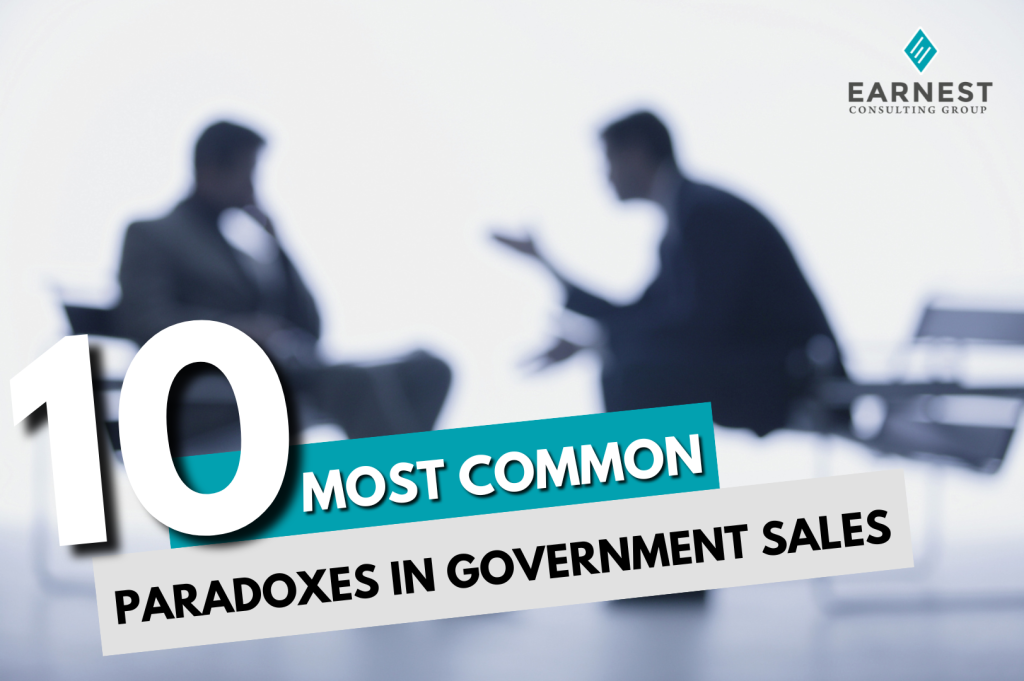Top 10 Most Common Paradoxes in Government Sales
September 24, 2024 | Government
Government sales are a unique challenge where success often comes from managing conflicting priorities and balancing seemingly opposing truths. These paradoxes can accelerate your path to winning contracts or slow you down if misunderstood. Let’s dive into the top 10 most common paradoxes in government sales.
1. Do Your Research, But Don’t Get Romanced by Data
To excel in government sales, it’s crucial to conduct thorough research. Understanding the agency’s priorities, the contracting officer’s preferred acquisition strategies and the budget landscape is key. However, there’s a potential trap: the more data you gather, the greater the risk of getting stuck in over-analysis. It’s easy to fall into the belief that just a little more information will make your strategy flawless, but the reality is that you’ll never have all the information. Instead, it’s important to develop a plan and take action on the plan as quickly as possible.
2. Be Persistent, But Know When to Walk Away
Persistence is key in government sales; contracts often take months or even years to materialize. But another reality is knowing when to walk away. Chasing every lead endlessly can waste valuable resources. You must be strategic in how long you pursue a contract. Sometimes, it’s better to cut your losses early and shift your focus to better opportunities or customers.
3. Build Relationships, But Don’t Rely Solely on Them
In the commercial world, relationships can be a shortcut to closing deals. In government sales, while relationships help, they’re rarely enough to win a contract. A government buyer’s hands are often tied by procurement regulations. Your connections can open doors, but if your solution isn’t compliant, cost-effective, or best-in-class, the relationship won’t save you.
4. Be Innovative, But Follow the Rules
Keep in mind that government buyers are looking for cutting-edge solutions, but at the same time, they expect vendors to strictly follow rigid processes and compliance rules. It’s like a balancing act – being innovative enough to stand out, but not so innovative that our product or service doesn’t align with their established frameworks. Winning means pushing the boundaries just enough while staying compliant.
5. Stand Out, But Blend In
Setting yourself apart is crucial in a crowded market, but it’s important to strike a balance. You want to highlight what makes your offering unique without going against established norms. The aim is to demonstrate your value while still feeling familiar and comfortable to potential buyers.
6. Understand the Process, But Expect Surprises
Understand the procurement process thoroughly. Yet, no matter how well-prepared you are, unexpected obstacles can arise—such as changes in the acquisition strategy, new regulations, or shifting political priorities. It’s a bit of a paradox because you need to be a master of the process while also being flexible enough to adapt to unforeseen challenges.
7. Get Feedback, But Don’t Let It Dictate Your Strategy
One of the most valuable aspects of dealing with government buyers is that they often give feedback on why you won or lost a contract. It’s important to listen to this feedback, but sometimes it can be misleading. Government buyers might have preferences that only apply to a specific project and not others. It’s a bit of a paradox – using feedback to improve without making too many changes to your overall approach.
8. Be Confident, But Not Arrogant
Confidence is vital when selling to the government because it conveys capability and trustworthiness. But overconfidence can easily come off as arrogance, which is a turnoff in the conservative and risk-averse world of government contracting. The key is to demonstrate your expertise while remaining humble and open to feedback.
9. Know Your Worth, But Stay Competitive
You need to price your solutions in a way that reflects their value. However, government contracts can also be awarded at times to the lowest-priced bidder that meets the requirements. The paradox here is knowing how to value your offering and stand by your pricing while ensuring that you remain competitive enough to win bids.
10. Be Flexible, But Stick to Your Core Competency
The government’s needs can shift quickly, and those who succeed often demonstrate an ability to pivot or adjust their offerings. But be careful: flexibility doesn’t mean chasing every opportunity that comes your way. Stick to what you do best, and adjust only when it aligns with your core competencies. The paradox is knowing when to be adaptable and when to stay the course.
Government sales are filled with paradoxes, and your success lies in understanding and managing these contradictions. The key takeaway is that navigating government sales requires balance. You need to be confident but humble, thorough but agile, innovative but compliant. Mastering these paradoxes will help you maintain the edge needed to win in the competitive world of government contracting.
« Back to Blog Home




